
Location: Terrey Hills, NSW
Established: 1994
Architect: Graham Marsh & Ross Watson
First Played: 14th Aug 2014
Last Played: 30th Dec 2016
Magazine Ratings

48 (Current)

50 (Current)
Another opportunity arose to play at Terrey Hills Golf and Country Club, so I didn’t hesitate to join. I have played the course quite a few times, through corporate days or social visits over the years. Each time going back I learn more of its intricacies, which impresses me more with every visit. My last time was with the company I work for and we held an event to win our company golf cup.
Note – This is a combination of two visits two years apart, which assisted in the actual story being on the website and a bit more relevant. The squarer (sometimes grainier) photos are from the 2014 visit.
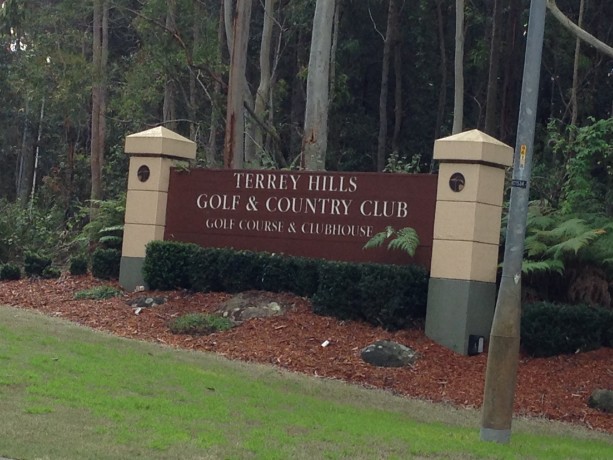
Entrance to Terrey Hills Golf & Country Club
Located north of Sydney and bordering Ku-ring-gai Chase National Park, the club sits on the outskirts of the city. You certainly get the rural, bush feel on the drive to the course.
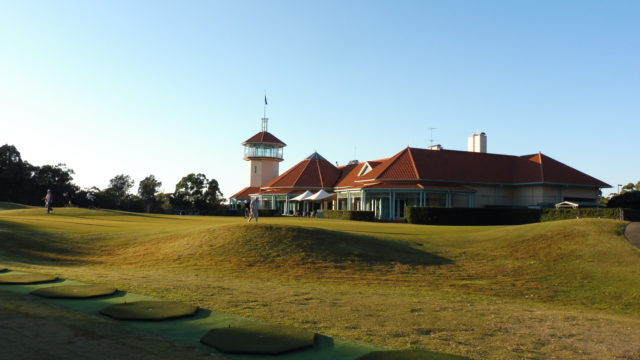
Clubhouse at Terrey Hills Golf & Country Club
The clubhouse is quite large and spacious. Every time I have been here, the outdoor areas have seen the heaviest use. Getting some fresh air overlooking the 18th green, is the best place to enjoy a cool beverage or quick meal. One standout feature is the tower adjoining, which can be seen from various points of the course.
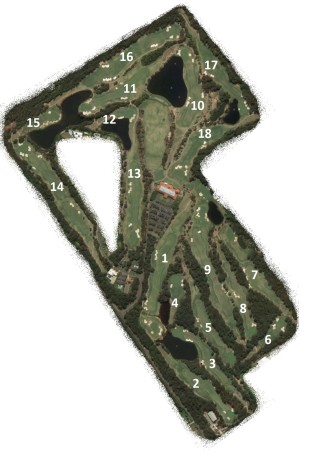
Map of Terrey Hills Golf & Country Club
Routing is back and forth at times, but also around some water bodies. Most fairways are tree lined, but not to the point where room is restricted, allowing for some wide fairways or areas of primary rough.
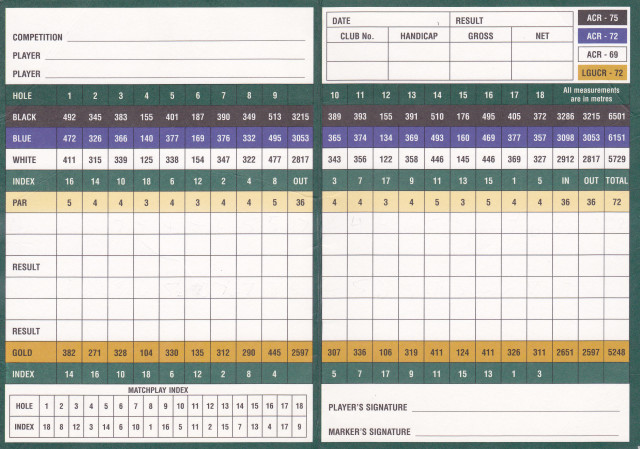
Terrey Hills Golf & Country Club Scorecard
Play has been made from various tees over the years. For this I have used the blue tees for distances.
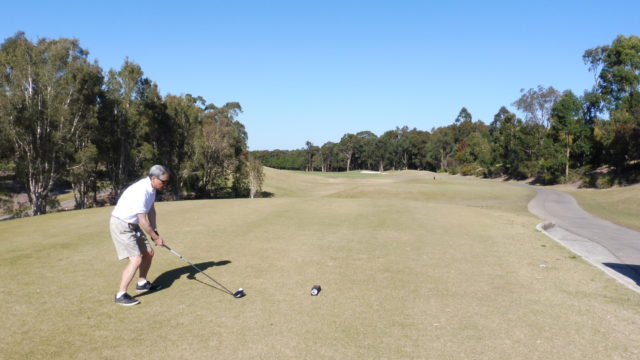
Hole 1 – 472 meter par 5
To start the round is the easiest par 5 on the course. With a sweeping turn to the left, the hole plays down hill all the way to the green. Longer hitters may reach some large down slopes which will gain valuable distance. A solitary bunker sits on the outside of the turn for those playing too far right, which is the ideal side to reach in two shots.
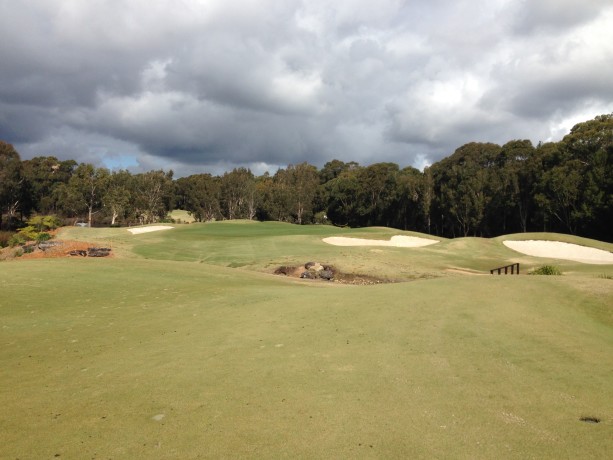
Forced carry before the 1st green
Water is located left of the fairway, which eventually cuts across the fairway short of the green. This is the only forced carry on the course. Traps run down the right side and behind the green, where the slope runs away quite steeply. Good hole to start the round, which really asks the question on the second shot.
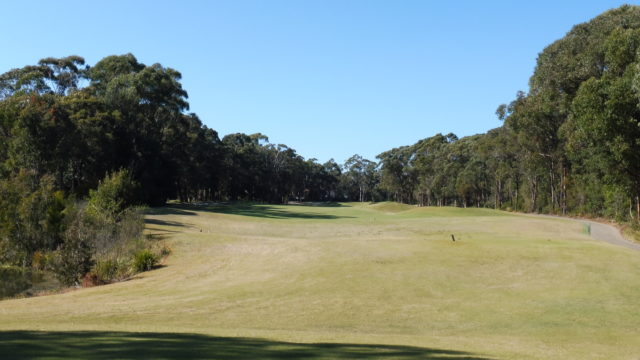
Hole 2 – 326 meter par 4
The shortest par 4 on the course, plays with a slight sweep to the right. With a bunker left of the medium width fairway, this narrows for those using a metal or driver. An ideal line would be down the center or slightly left. A large mound is found to the right, with large trees following, which makes the approach almost impossible.
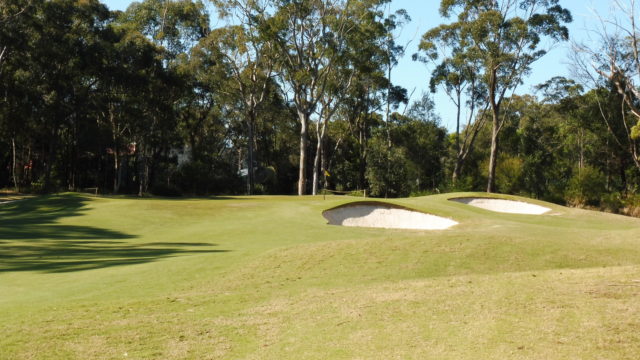
Bunkers protecting the 2nd green
Two bunkers are found right of this small elevated green, with one front left. There are a few smaller swales around the complex, with varying length in grass. Moisture is an issue on this green, evident by the large fan found at its rear. This is one of the weaker holes on the course in my opinion. There isn’t a real incentive to try and take on the narrowing fairway.
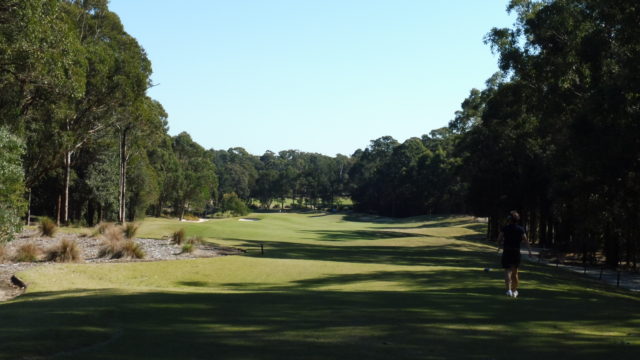
Hole 3 – 366 meter par 4
A challenging mid length par four, which sweeps slightly to the left. From the tee a large mound is found left containing a bunker. Longer hitters must be cautious with the drive, as this mound hides a water body. The back side of the mound leads down to it. Beyond this point the fairway narrows significantly.
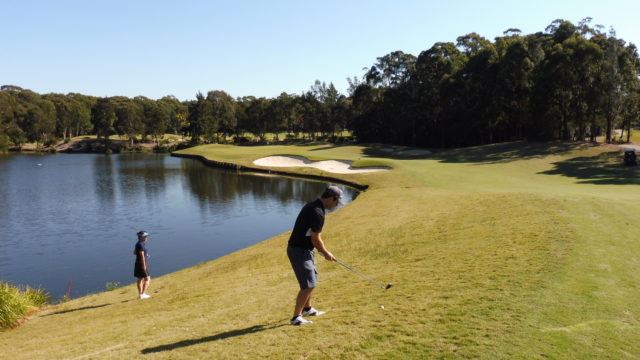
Approach to the 3rd green
Finding the fairway is critical to ensure a slightly easier shot into the green. Being left will ensure a water carry is required, as well as a large bunker located before the green. Those to the right, although having a longer shot, will have more options with the approach. A large mound is found to the right of the green, which may assist the golfer finding the putting surface. This hole requires some accuracy to make play easier. Asks questions of every shot, offering a bit of risk and reward for each.
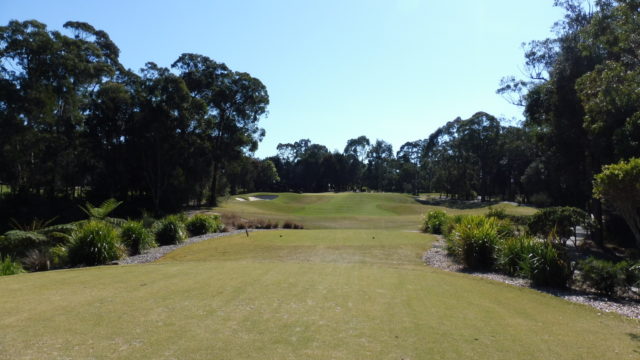
Hole 4 – 140 meter par 3
Coming to the easiest hole on course, is a mid length par 3. This plays up a reasonable slope to an elevated green. From the back tees, water is visible on the left, but really shouldn’t come into play. Anything not hit solidly or with the wrong club, has a chance of rolling back down the slope some distance. Bunkers are located either side, with the front left more prominent from the tee.
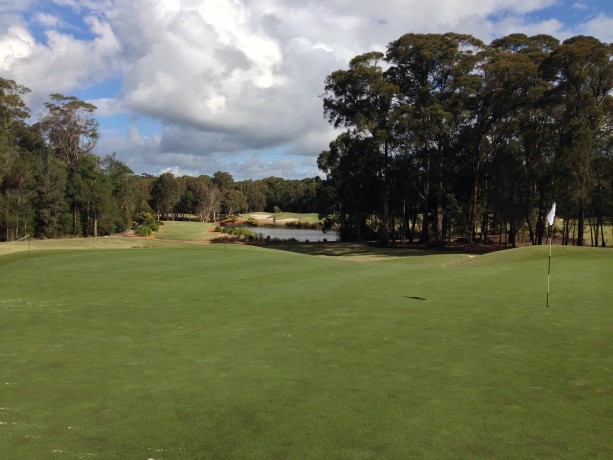
Slightly undulating 4th green
Either side of the green are some large swales and mounds to contend with. The grass is tight in areas, allowing for a variety of shots if missing the green. There are some decent contours on the putting surface, with some sloping away to the surrounding swales.
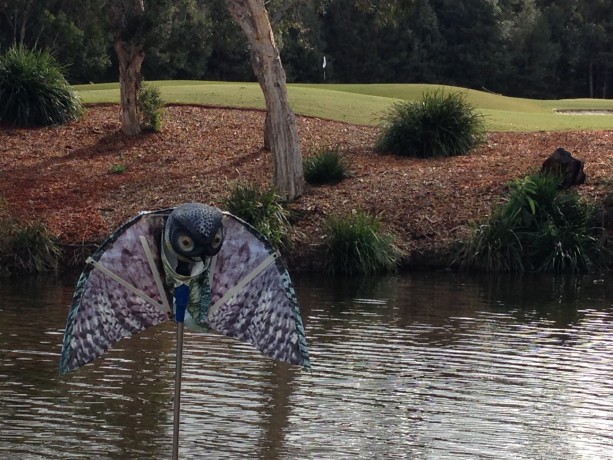
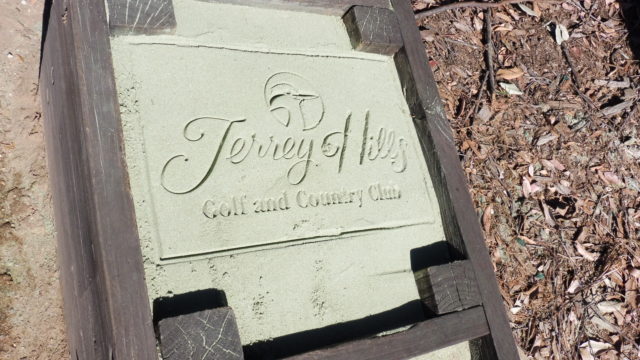
Owl to keep the pests away and club logo stamped into sand
Over the years I have seen some interesting things around golf courses. The owl was quite decorative to ensure birds were not destroying the ground in a newly laid area. Quite unique was the logo stamped into the sand box. The first I have come across, but adds a nice touch.
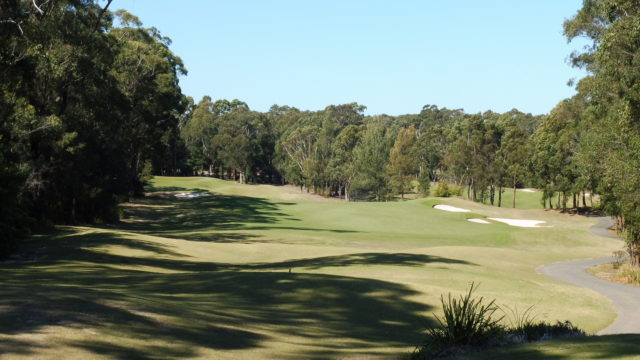
Hole 5 – 377 meter par 4
Playing back down the slope is a sweeping par 4 which angles to the left. A group of bunkers are found right, just before the ground falls away further. Another is found left, which is slightly off set in distance, but not dramatically. Playing closer to the left side allows a clearer line to the green.
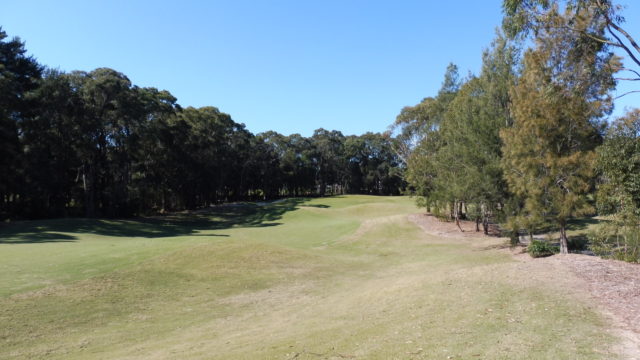
Approach from the 5th fairway
A few large mounds are found on the narrower section of fairway, leading into the raised green complex. Although the fairway is a lot narrower, the primary rough is quite wide in distance, penalising the golfer, but not so much where the ball cannot be found. The putting surface has two tiers, getting larger in size towards the rear.
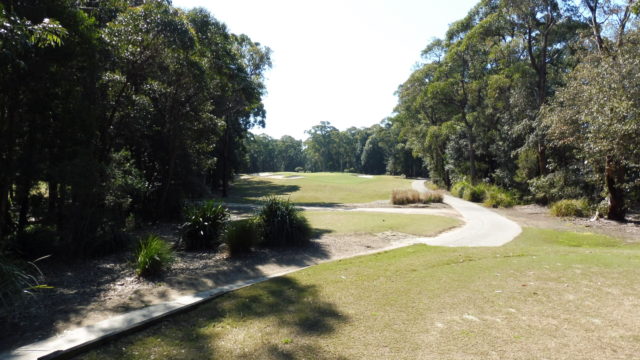
Hole 6 – 169 meter par 3
The longest and hardest par 3 at Terrey Hills Golf & Country Club plays up a slight slope towards the green. Some small mounds are found short of the green. Bunkers are found either side, with those on the left protruding slightly to the front.
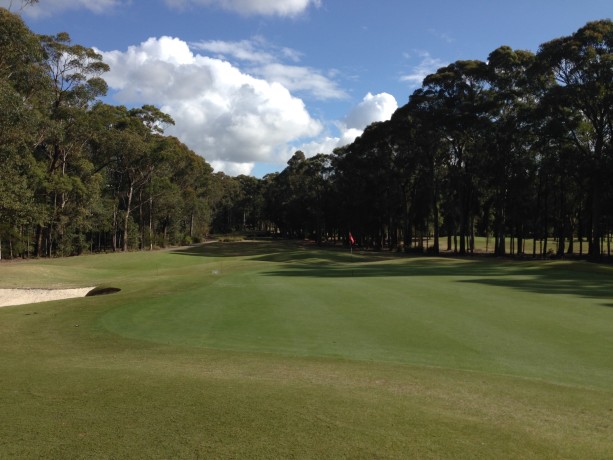
Looking back from the 6th green
The green complex runs away on all sides, more so at the rear. Some gentle slopes are found on the putting surface. Playing much longer than its distance along with the long green, makes this hole harder than it looks.
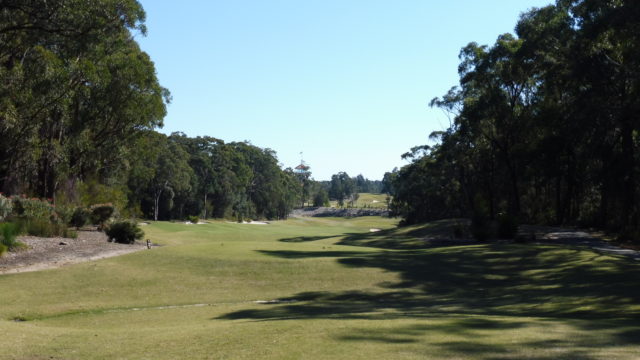
Hole 7 – 376 meter par 4
Coming to the second hardest hole on course, sees play back towards the clubhouse, with the tower being visible from the tee. This also is the ideal line to play, with the fairway sloping to the right, but also away for longer hitters. Three bunkers are found left of the fairway, which if found will leave a difficult approach.
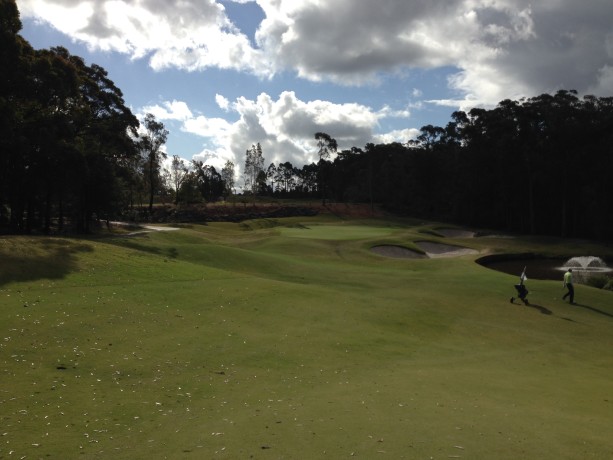
View down to the 7th green
For those playing the first time, it is wise to go up to the edge of the down slope to gain a clearer picture of what awaits, as only the putting surface will be visible. Hidden is a water hazard to the right, followed by the cavernous bunkers. Lots of shaping is found around the green, which itself has a slightly undulating surface. One of the standout holes for the front nine
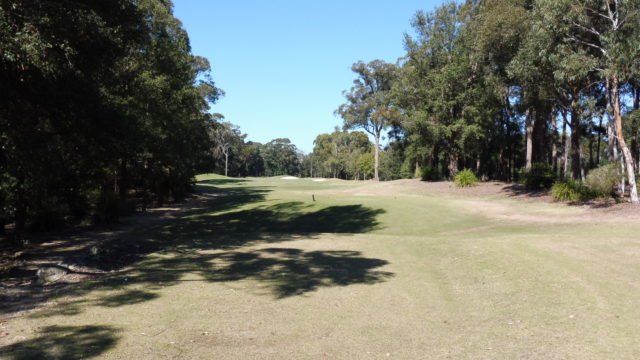
Hole 8 – 332 meter par 4
Heading away from the clubhouse, is this shorter par 4, with a slight turn to the right. A large bunker is found on the right, coming in to block half of the fairway. This can be carried, but requires accuracy to find the smaller section of fairway beyond.
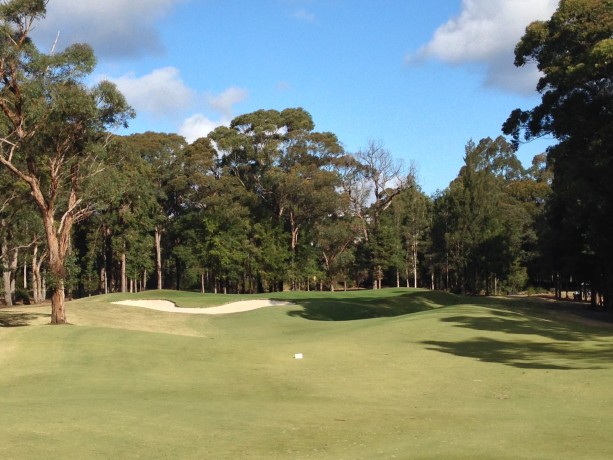
Approach to the 8th green
Managing to carry the bunker, will possibly see the ball gain extra distance, with a large down slope found just beyond. Finding the right side of the fairway allows an easier approach, possibly avoiding the green side bunker, but missing the green right leaves a difficult pitch. Another putting surface with various undulations, leaving the rear almost on another tier. Short hole which will could reward those successfully taking on the risk of the tee shot.
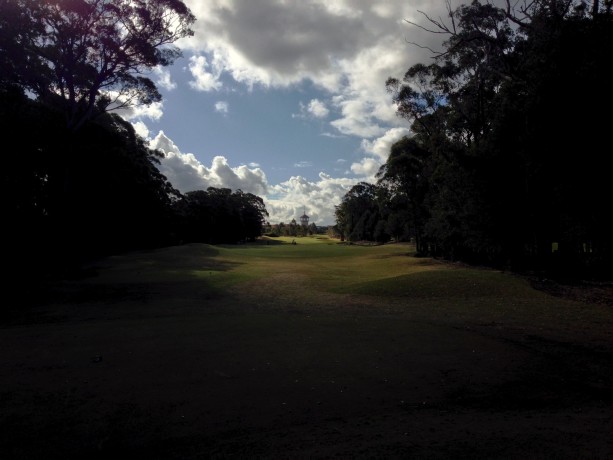
Hole 9 – 495 meter par 5
To finish the first loop is the longest hole on course hardest, also the hardest par 5. Playing up a gentle incline, the hole eventually turns right towards the green. The fairway has a wide landing area for the tee shot, although a long bunker is found to the right.
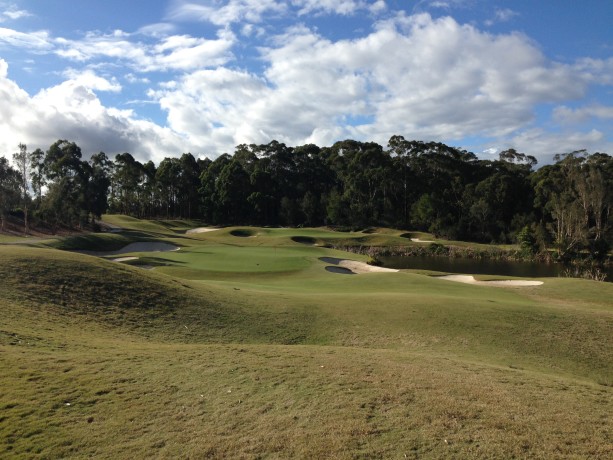
Looking across the 9th fairway
For most golfers, the second shot will be short of the last bunkers, before the ground drops towards the green. Some large bunkers are found leading in along the waters edge to the right. The green sits built at the base of a slope, with further bunkers found between the two. A lot is happening around the green and will require an accurate shot to avoid trouble. With a spine through the middle, the putting surface has some gentle slopes to contend with. A tough hole to finish the front, but certainly enjoyable.
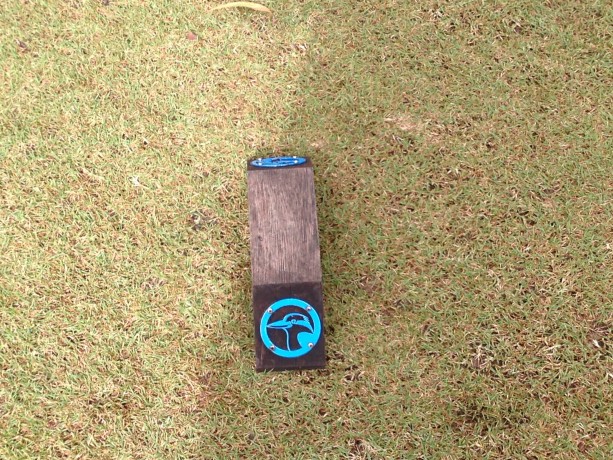
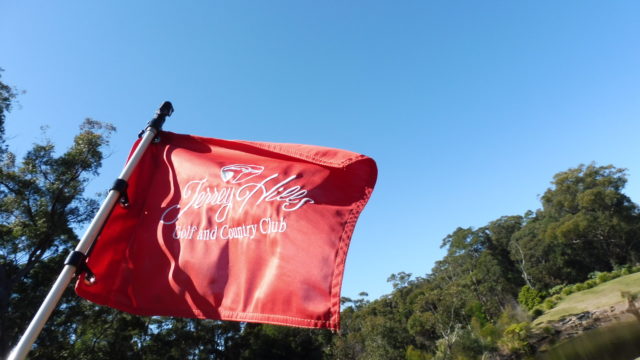
Tee marker and pin flag
The hole markers where standard wooden structures showing hole, distance and par. I find the tee markers interesting, being wooden with a coloured club emblem according to the tee colour. Pin flags were various colours to show location on the green, also having the club logo.
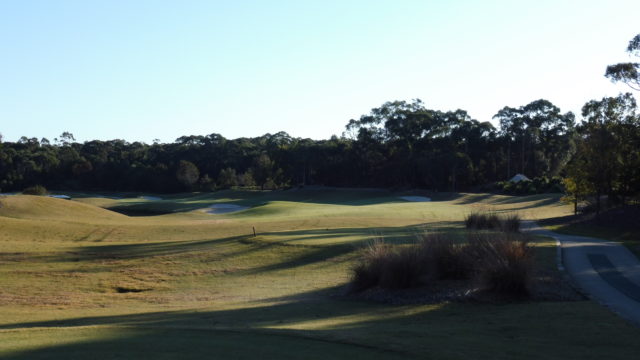
Hole 10 – 365 meter par 4
Starting the second loop is this medium length par 4 with a dogleg left. Playing down a gentle slope, bunkers are staggered either side, with the added penalty of water on the inside of the turn. The fairway slopes mostly to the left, with varying undulation found along the way.
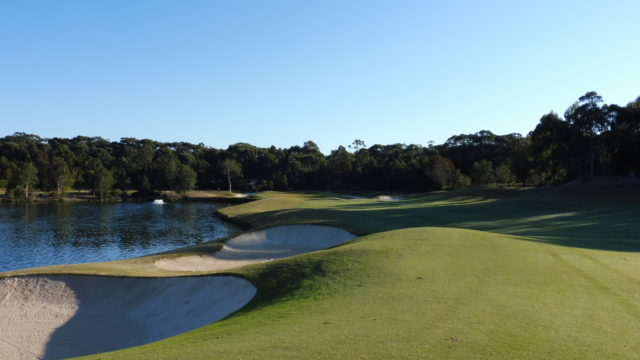
Trouble along the 10th fairway
Playing the approach is remains a downhill shot, where the green sits alongside the water. Traps are found short and to the right, whilst another sits towards the left rear (protecting those on the 11th tee more than anything else). The green has some slope away at the front, with a slight tier change towards the rear. Although trying to cut the corner is not really an option (except for extremely long hitters), this plays a traditional sweeping hole. Great hole to start the second loop.
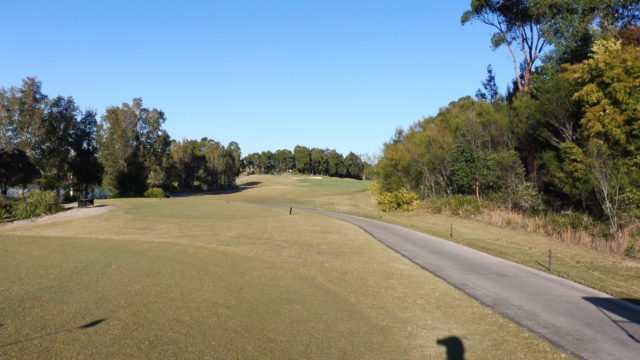
Hole 11 – 374 meter par 4
With a dogleg to the right, another mid length par 4 plays to a saddle from the tee. A large bunker sits on the left, whilst two smaller traps are partially blocked to the right.
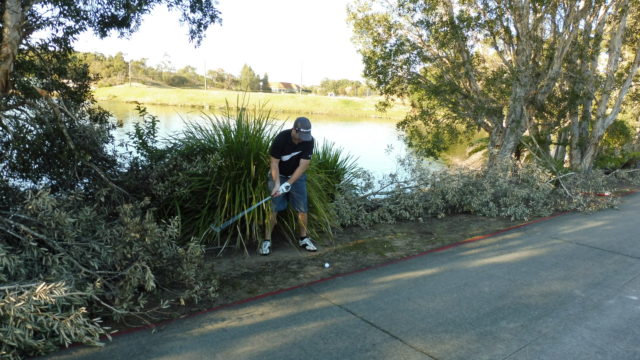
Matt playing out of the hazard on 11th
Playing partner Matt found some trouble off the tee, but managed to recover well.
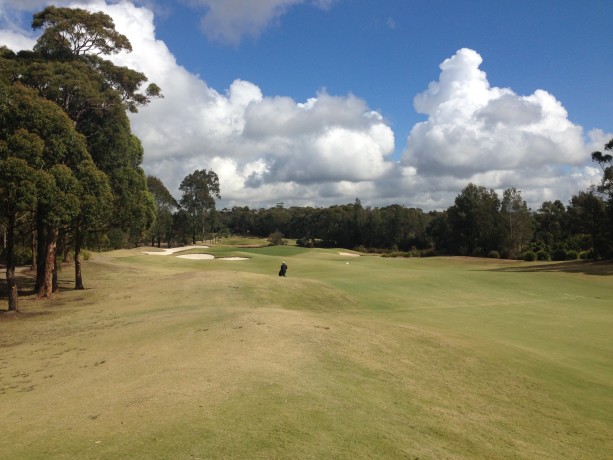
View from the 11th fairway
The green sits partially out over the water, with three traps on its surrounds. Anything long here is likely to end up wet. A large hollow is short right, which is the side having the better angle into the green.
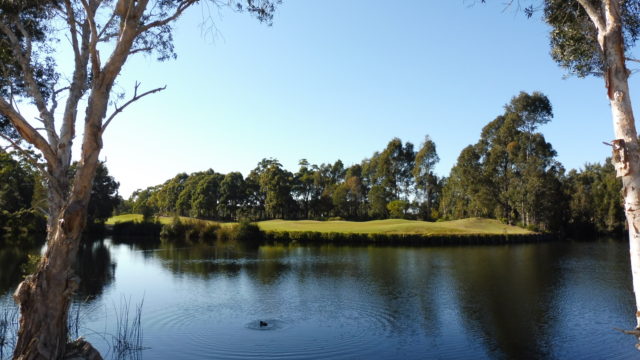
Looking across at the 11th green
The 11th and 15th greens are visible from either side of the water hazard.
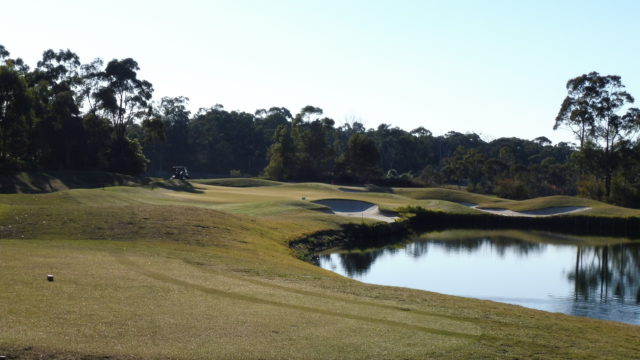
Hole 12 – 134 meter par 3
The shortest par 3 on course plays on the outskirts of a water hazard. Probably one of the more scenic shots you will play on the course.
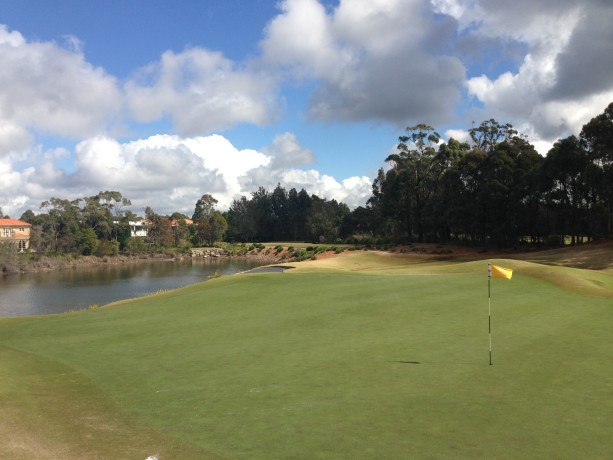
Looking back from the 12th green
Bunkers and gullies surround the green complex, which requires an accurate shot to find the target. The putting surface is quite long but not overly wide. Nice challenging short hole which is quite memorable.
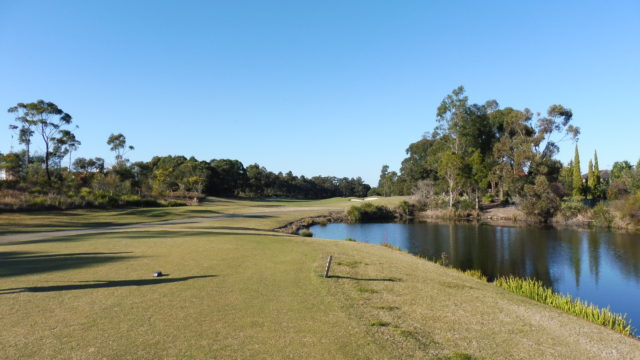
Hole 13 – 369 meter par 4
Another mid length par 4 follows, which plays relatively straight. Large bunkers to the right are to be avoided, although playing center to right offers a better line into the green.
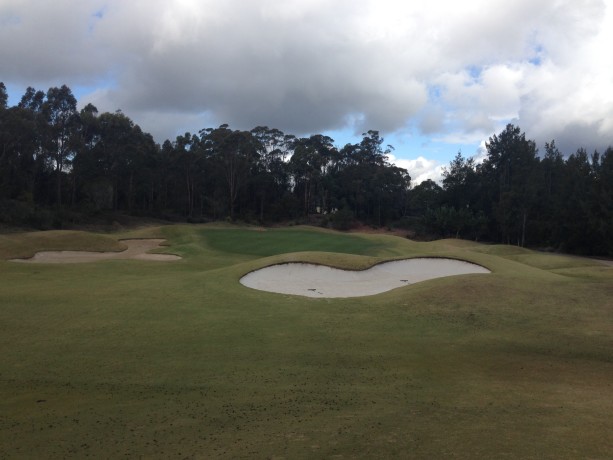
View to the 13th fairway
The approach shot plays slightly downhill to a large sloping green. A trap is found short on the right and if carried will allow the ball to run up to the green. Another large trap to the left is green side, covering half the length of the complex. Allow looking straight forward the hole plays more difficult.
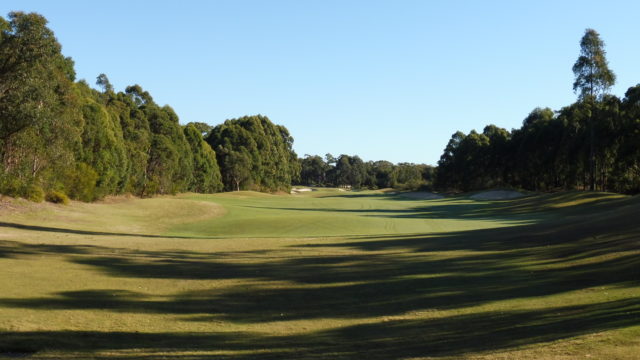
Hole 14 – 493 meter par 5
The longest par 5 on the back loop, there is ample width for the tee shot, although bunkers down the right should be avoided. Center or right offers the better line for the second shot, with bunkers not obscuring the green entrance.
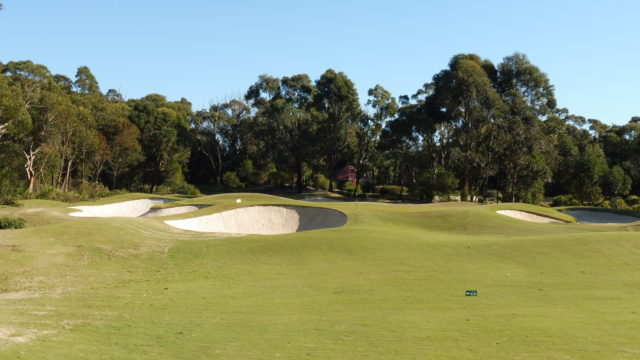
Approach to the 14th green
If a layup is required, applicable to most players, avoiding traps either side of the fairway within the one hundred meter mark is critical. Sitting elevated above the fairway, this green complex has a large slope at the front, along with bunkers on all sides. The putting surface slopes away towards the rear, punishing any long approach. Strategy comes into play with the second and third shots and if executed incorrectly, could cause issues.
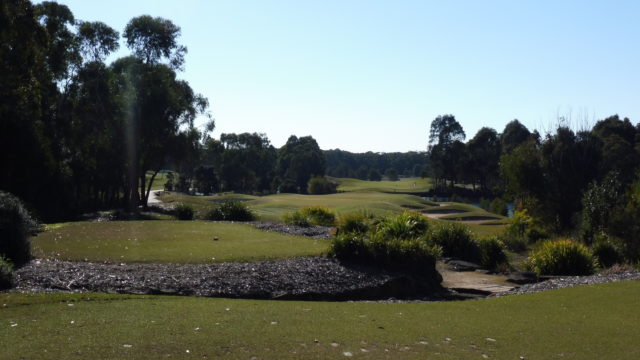
Hole 15 – 160 meter par 3
The last one shot hole for the day is of mid length. Play is from a slightly elevated tee with water running down the right side.
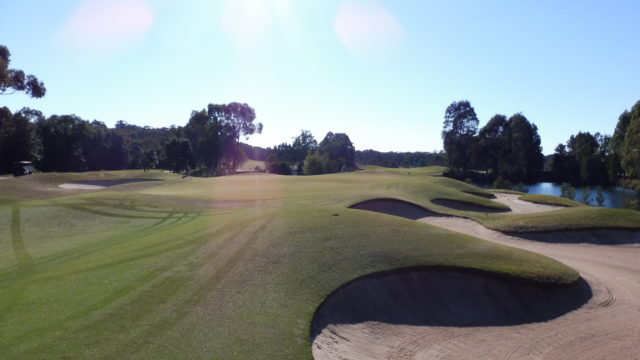
Long bunker beside the 15th green
A bunker sits between the water and the green, running longer than the green itself. Another trap is left of the narrow putting surface, although a large area is available short for any miss. The view could be improved further with removal of some trees bordering the water hazard. Great way to finish the short holes on the course.
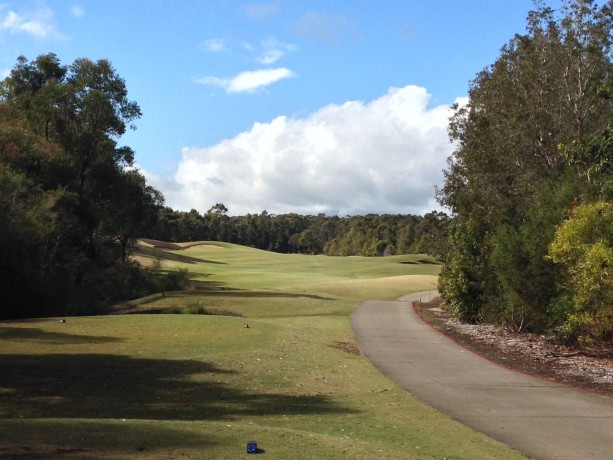
Hole 16 – 469 meter par 5
Finishing the traditional three shot holes, is the shortest par 5 on the course. The fairway slopes from the left, with a large hill located on this side, bunker in built. Managing to carry this will gain valuable distance and leave the best line for an approach in two. Further traps are located to the right.
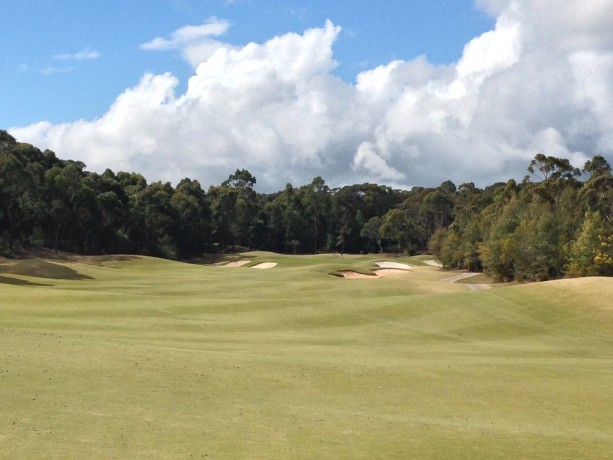
View from the 16th fairway
For longer hitters, this green is reachable in two. for those not quite confident, laying up towards the center is a great option. Another elevated green, which is much wider than it is deep, in particular on the right side.
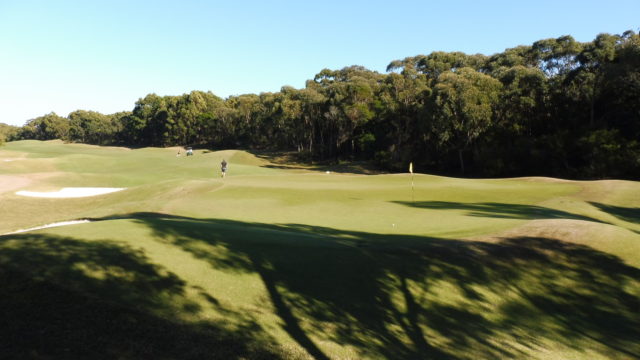
Looking back on the 16th green
Anything slightly long may see the ball run down a slope at the rear. A hole which plays relatively easy, but could turn a match, especially for aggressive play.
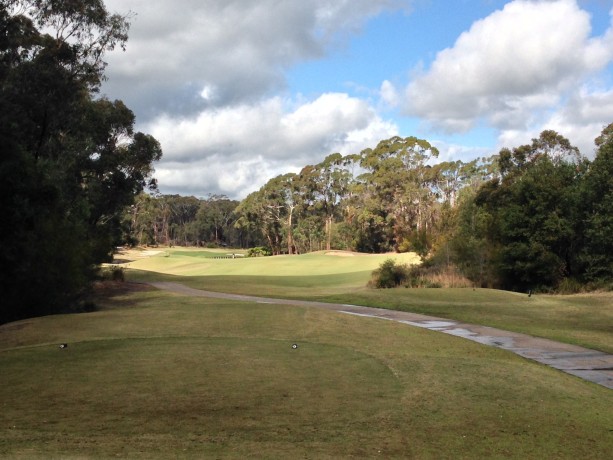
Hole 17 – 377 meter par 4
The final two holes are my favourites on the course. First the hardest hole at Terrey Hills, which is equal longest par 4 with 5th. Hitting an accurate tee shot is critical. Too far right will block the approach to the green, whilst left in a small valley will leave an obscured shot.
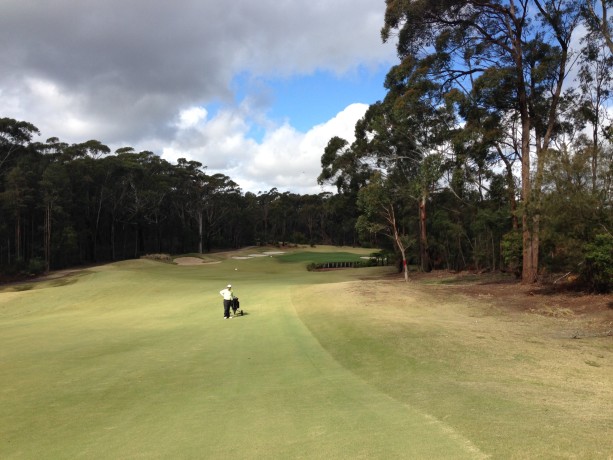
Down slope to the 17th Green
This is one of the most demanding approach shots. Playing almost through a narrow shoot, to a green with water down the right and bunkers down the left. If not confident it is best to layup.
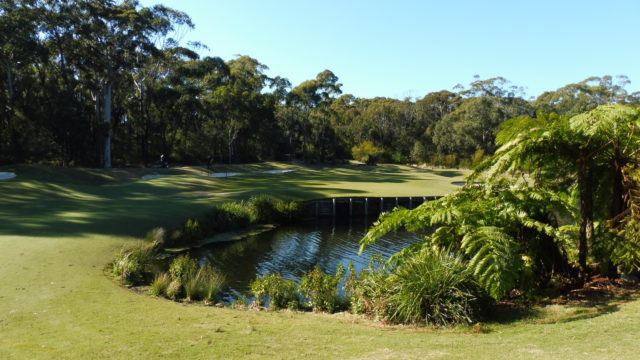
View across to the 17th green
Not the widest green on the course, this narrow strip has some varying slopes and undulations to contend with. This isn’t ranked the hardest hole for no reason. In the half dozen times I’ve played this course, this has been the only time walking off with a par. It was a very satisfying feeling.
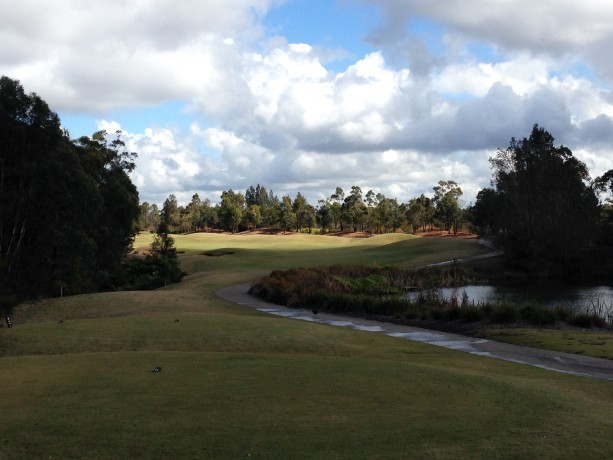
Hole 18 – 357 meter par 4
Finishing the round is a dogleg left hole, playing up a medium gradient. A slight carry over a hazard is required from the tee before reaching the fairway. Two deep bunkers sit on the inside of the turn, beyond which is out of bounds, which runs almost the entire length of the hole. It is possible to play through the fairway if aiming too far right.
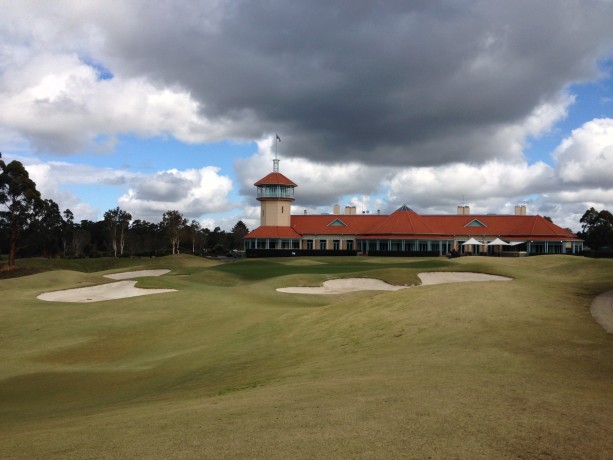
Clubhouse sitting behind the 18th green
With varying mounds and hollows on the fairway, the approach is required to miss three bunkers in front. The green is quite shallow, with a few swales found at the rear. A putting surface which has multiple tiers and may leave some testing shots. Great hole to finish the round, with the clubhouse sitting in the background.
In summary, with each visit my liking for this course has improved. The first visit was a bit overwhelming, but the intricacies of the course have been learn’t and applied with each consecutive time playing. Conditioning of the course, well that is great, which you would expect for a championship course. I have only had one case where the 2nd hole was quite damp, but only the one time.
But it is the overall design which impresses. Ample room has been left to allow all levels of golfer to enjoy their game, but at times accuracy is required to ensure the correct strategy can be played. The fact that although heavily tree lined at times, these have been kept back from the fairways mostly to ensure they don’t interfere with play, although the second does use some trees to force a certain line. There was ample room between the fairway and trees of primary rough. Long enough to penalise, but still allowing the ball to be found in a timely fashion.
There are a lot of rolling hills, mounds and hollows on the fairways. If you were to look really hard, some would stand out as being manufactured, but these seem to blend in quite well due to the area in which the course is found.
Looking at the course makeup:
- Hole Directions – There was a some variety allowing for conditions to have wide ranging effects during play, although slightly limited. Heavily favoured where holes facing in a northern or southerly direction. Not many at all had a westerly facing tee. The back nine certainly seemed to be routed better, not feeling like you were going backwards and forwards, although the last hole did face in a westerly direction. This has the possibility of being effected by the afternoon setting sun
- Hole Lengths – Par three holes had some variance in distance, although they were all in the mid length. Par four holes ranged from short to long with the majority being either mid or long length. For the front these were evenly spread out, although the back had only 20 meters separation for the five par 4 holes found. Par 5 holes were mainly long, with one mid length. These were mixed up throughout the round quite well.
- Hole Layout – There was some mixture in how the holes played, although a heavy majority favoured left turns, where two shots or more were required to reach the green. This was almost at a two to one ratio
Green complexes are mostly elevated, but not to the point where they look like push-up greens. These are surrounded by various obstacles, bunkers and water, to ensure some variety, but there is also a variety in grass lengths on the surrounds. At times it is tight, allowing for different styles of shot to be played, whilst others have a mixture of longer and shorter grass.
Certainly a course I look forward to playing again as it offers a variety in play.
For the record my twosome one the event for the day. For ten years I have been trying to win the event, that has finally come to fruition, making the day that more enjoyable.
How to play at Terrey Hills Golf Club:
1. Be invited by a member
2. Be an interstate or overseas visitor who is a member of a golf club
3. Work for company with corporate membership of the golf club

